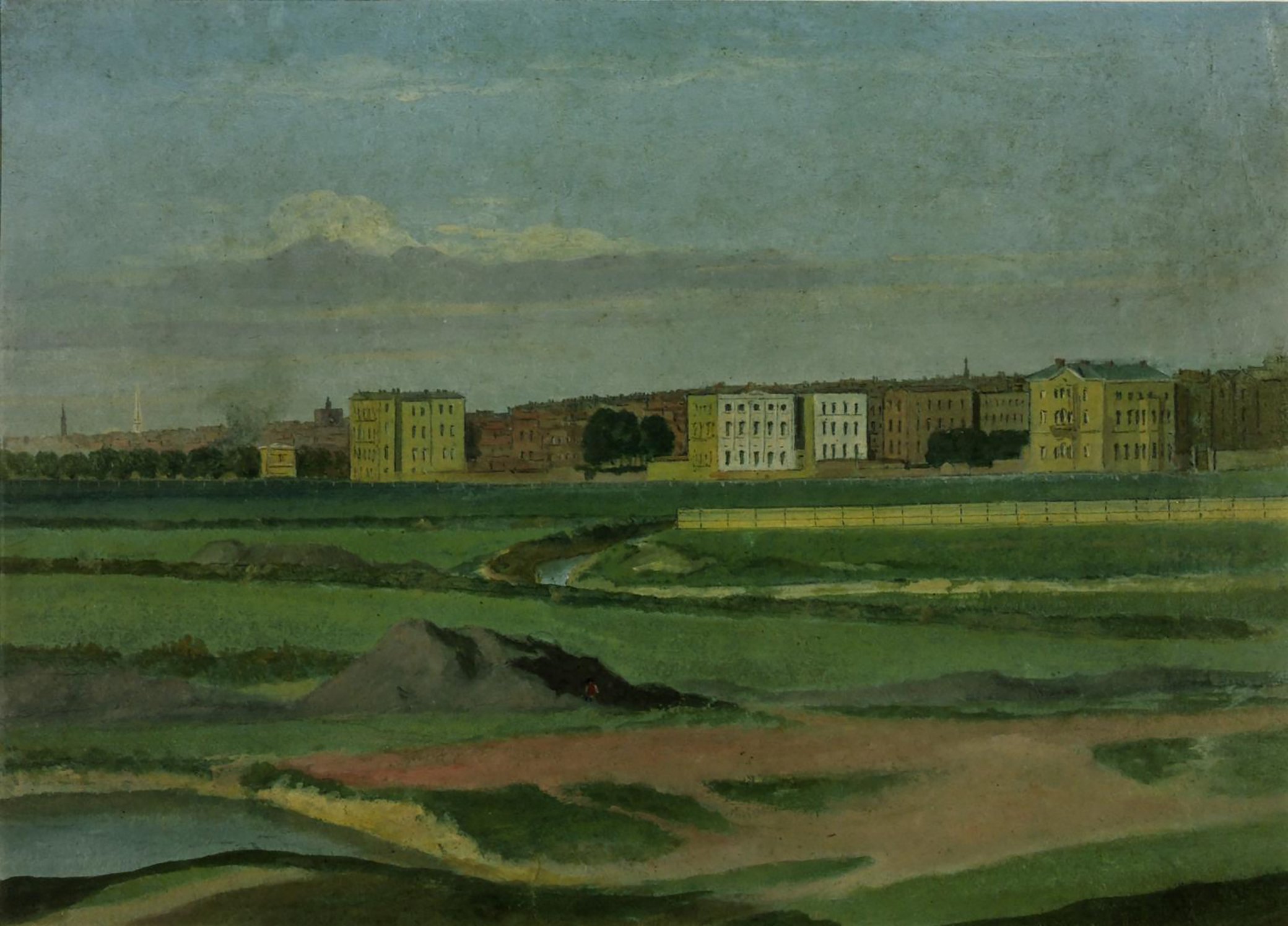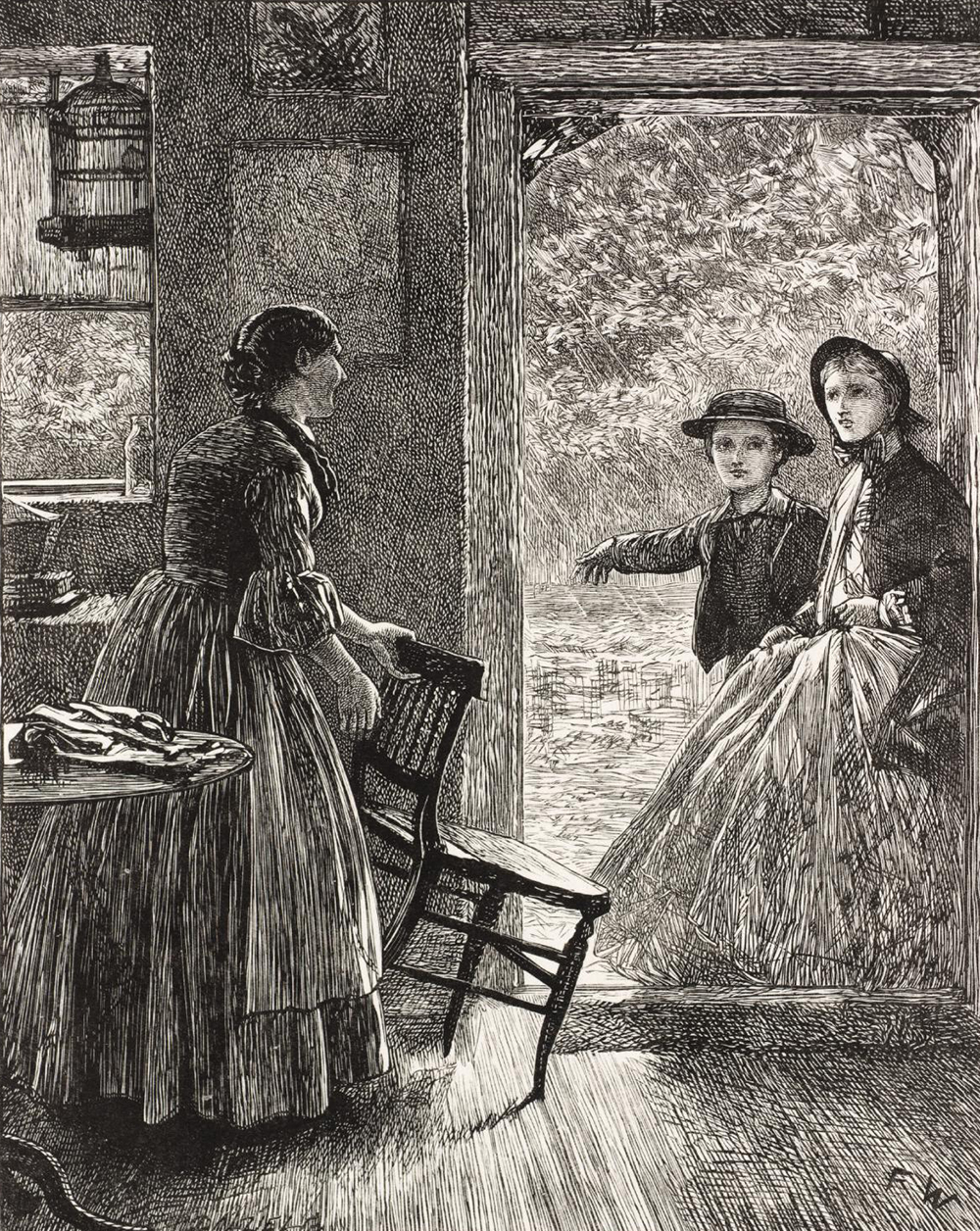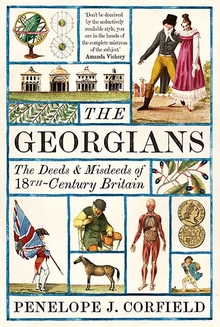
The Outskirts of London: A View Looking Toward Queen Square, by Thomas Jones, c. 1785. Photograph © Tate (CC-BY-NC-ND 3.0).
The Georgian era was an acutely time-conscious one; and people in growing numbers began to produce brisk summary verdicts upon their own era. In fact, it is often tricky to identify the full trends of the times whilst living through them. (Try helping future historians by writing a pithy summary of the early twenty-first century in the form of a diary, blog, or tweet.) But defining the times remains a popular form of instant journalism. Books published in 2000, for example, pronounced upon the current “Age of Globalization,” “Age of Virtual Reality,” “Age of Uncertainty” (a perennial favorite), or, more starkly, this “World of Lies, Hype, and Spin.” Authors who make such generalizations are not under oath. There’s nothing to stop them from adopting extreme views to make a point and then later changing their minds. These same qualifications applied to the Georgians who named the long eighteenth century. Nonetheless, their summary verdicts provide historians with a good starting point.
Over two hundred pithy Georgian dicta about “the age,” “the times,” or, more rarely, “the century” have to date been identified. (There are always more to find.) By the early nineteenth century, the practice of age-naming was commonplace. For the young philosopher John Stuart Mill in 1831, it was especially characteristic of a society in transition: “The idea of comparing one’s own age with former ages, or with our notion of those which are yet to come, had occurred to philosophers; but it never before was itself the dominant idea of any age.”
In fact, the age-naming process had begun much earlier than Mill imagined. Yet his general point was a good one. Georgian commentators were characteristically aware of change, whether they approved or disapproved, and were keen to convey their views to others. About half the Georgian age-namings expressed shades of woe and despair. Some were apoplectic; others mildly nostalgic. Their cultural negativism was, for the young Samuel Taylor Coleridge in 1794, metaphorically located “a thousand fathoms deep in the dead sea of pessimism.” This particular abstract noun was at that date a novelty. Yet attitudes of woe, gloom, and deep despair were not.
Grumbling is, after all, a human reflex, especially among the ill and embittered. In 1769 one commentator announced (without proof) that “we are almost universally unhappy.” Farmers who were subject to the vagaries of the weather were particularly famous complainers. The touring missionary John Wesley noted that characteristic in 1766. Observing the country farmers, he remarked, “In general, their life is supremely dull, and it is usually unhappy too.” Yet townspeople were also vociferous in complaining. “Gloom and misanthropy have become the characteristics of the age in which we live,” mourned Percy Bysshe Shelley in 1817, temporarily downcast by the weakness of reform campaigns. Getting into the market for pessimism, a poet in 1840 versified eloquently about the current Age of Lead, declaiming: “What doleful days! What driveling times are these!”
Some degree of stylized grumbling was customary. Taxes were too high, prospects for trade too uncertain, governments too “corrupt,” weather too fickle. As a result, a character in a 1758 drama announced chirpily that “the people of England are never so happy as when you tell ’em they are ruined.” Georgian voices of pessimism must therefore be interpreted with a pinch of salt. Yet it’s still highly instructive to know what issues were causing concern and what complaints were expected to trigger a sympathetic response.
Approximately half the Georgian age-namings were critical or pessimistic; of those, approximately half focused upon national danger. Complaints were couched in generalized terms, sometimes with the addition of phrases—“as everyone knows,” for example—intended to supply proof. Sources of danger were manifold. Moral decay was a perennial favorite. It was “a dull censorious uncharitable age,” argued one tract in 1699. Or it was a “Cheating Age,” according to a pamphleteer, denouncing in 1705 the “vast sums of money” spent on fighting France. Joining the pessimistic chorus, a balladeer called it “the Age of Mad-Folks” in 1710. And the High Church Anglican preacher Henry Sacheverell caused a public sensation with his sermons, diagnosing “a Church and Kingdom debauch’d in principles, and corrupted in manners, and…given over to all licentiousness…all sensuality, hypocrisy, lewdness, and atheism.”
Accusations were emphatic, if not always specific. Readers of a guidebook to The Present State of Great Britain and Ireland in 1716 learned that they lived in “a depraved age,” although the author conceded that “virtue is not yet banish’d out of the land.” Others were not so hesitant. Particularly during the long premiership of Robert Walpole in the 1720s and 1730s, there were searing attacks upon political corruption and the arts of patronage; it was a “very depraved and corrupt age” (1726). And in 1727 one poet lamented: “Well—we have reach’d the Precipice at last; / The present Age of Vice obscures the past.” This rhetoric implied a crisis of unheralded proportions. And the target of complaint? It was the new fashion for masked balls, which were said to be encouraging sexual debauchery and an undue mingling of “incognito” revelers from different social ranks.

Women were specifically to blame, in the view of several commentators. “So vain and wicked is our age,” claimed Several Discourses…Addressed to the Ladies of the Age in 1689; the “fair ones” were too becoming bold and saucy. That accusation was a grumbler’s favorite, often appearing in satirical prints and reproachful sermons. Yet men, alas, were fallible, too. Another poet in 1727 criticized the Luxury and Effeminacy of the Age. Young men should cease to act like coxcombs. Effeminacy would ruin the nation. A later jeremiad in The Times: A Poem (1764) feared specifically that too many men were being tempted into sexual relations with their own sex, warning wryly, “Woman is out of date, a thing thrown by / As having lost its use.”
Luxury was often attacked, too. It was becoming a code word not just for economic growth but for moral rot, consequent upon new wealth. Problems were especially highlighted when consumers favored extravagant fashions, copied from “a vain neighboring nation”—meaning the frivolous French. That complaint came from a tract against The Reigning Vanities of the Age in 1754. A letter in The Gazetteer in the same year concurred that luxury in clothing was blurring social distinctions, so that “by their dress, the clerk, apprentice, or shopman are not distinguishable from their master; nor the servant-maid, even the cook-wench, from her mistress.”
Military crises propelled the disaster literature into overdrive. Failures in battle were feared as signals of divine wrath. After the 1745 Jacobite rebellion, James Burgh, a moderate reformer, chastised the familiar faults of luxury, idleness, irreligion, and sensuality. Such vices had destroyed great empires in the past and could easily do so again. The confrontation with the America colonies provoked further woe. A Nonconformist minister in Nottingham agonized in 1778, “Our country bleeds at its heart; our vices have risen to their crisis…and Britain, the envied among nations, the seat of glorious liberty, and science, and law, the refuge of the oppressed, the friend of mankind, is sinking into ruin.”
Admittedly, that preacher did concede that Britain had a lofty reputation, at least among friends. Yet that very fact, for patriots, made things worse. In December 1781 the ever-excitable Horace Walpole wrote of “the crisis of our total ruin.” Meanwhile, a French visitor, the comte de Mirabeau, who resided in England for several months in 1784, was wryly amused. To him, the country seemed rich and prosperous. Yet he observed that there were enough tracts on Britain’s national decline to fill a huge library. However, just as rich people don’t generally become rich by squandering money, so the acquisitive Britons did not amass extensive overseas interests by losing prime colonial territories cheerfully.
Disaster literature hit the absolute heights in the 1790s, as the French Revolution unfolded and warfare with France followed. Many viewed the conflict in religious terms. Yet some pointed to secular trends. “The age of chivalry is gone,” pronounced the political philosopher Edmund Burke, famously, in 1790. Instead a harsh new world of “sophisters [debaters], economists, and calculators” had arrived. Martial valor was failing. A middling-status Witham grocer named Jacob Pattisson waxed sardonic in a private letter dated January 1794: “Formerly one Englishman was said to be the equal to three Frenchmen. But now the degenerate brood cannot stand their ground against the scum of that rising nation of men, their sansculottes.”
Traditional ways were sapped by “Modern Infidelity” and “Modern Philosophy,” added the conservative propagandist John Bowles in 1800. “Never was the world in so calamitous or so perilous state as at this moment.” Somewhat incongruously, Bowles again found fashionable women to be most at fault: their “indecent modes of dress” in the latest modish thin drapery were not just lewd and unhealthy but socially calamitous. “Female modesty is the last barrier of civilized society”—hence, he asked in anguish, “When that is removed, what remains to stem the torrent of licentiousness and profligacy?”
Warnings came from all points on the ideological spectrum. A bluestocking lady with liberal views warned of the costs and dangers of warfare. “Ruin, as with an earthquake shock, is here,” declaimed Anna Laetitia Barbauld’s poem “Eighteen Hundred and Eleven.” “Arts, arms, and wealth destroy the fruits they bring; / Commerce, like beauty, enjoys no second spring.” However, it was not straightforward to be a Cassandra. Barbauld was roundly criticized as being unpatriotic, her denunciations of the war being considered untimely.

After triumphing at Waterloo in 1815, meanwhile, Britain no longer feared military invasion. The public mood changed and optimists had freer rein. Yet pessimists still had domestic gripes. “Was there ever a period at which the vigorous hand of a satirist was more necessary?” demanded a Tory antireform newspaper, the Spirit of the Age, in 1829. This diatribe attacked all those “rogues, swindlers, idiots, buffoons” who sought constitutional reform. By contrast, John Wade’s polemical Black Book: Or, Corruption Unmasked (1820–23) argued that the stupidity was all the other way. Aristocratic factionalism was reducing a potentially rich and great country to “a woeful spectacle of want, misery, embarrassment, and degradation.”
Economic growth, meanwhile, was no simple panacea. One ballad (c. 1830) sang ironically of pollution in the thriving “cottonopolis” of Manchester: children were choking in the dense plumes of factory smoke “so black, so thick, so nourishing / …It makes me mad to hear folk, really, / Cry Manchester’s improving daily.” Environmental damage stalked outward success stories.
Deep-dyed pessimism was a satisfying reflex in times of anxiety. In 1758 the middling-status shopkeeper in the small village of East Hoathly in Sussex, Thomas Turner, reacted in his diary to a local episode of arson with unstinting woe: “Oh what a continuing proof is this of the predominancy of vice and wickedness in this irreligious age.” However, two days later his mood had changed entirely. Turner was intent upon self-improvement, confiding to his diary: “Oh what an unspeakable pleasure it is to be busied in one’s trade and at a leisure hour to unbend one’s mind by reading!”
Pessimism was thus a variable attitude—as were its outcomes. In some circumstances a reasoned pessimism could be advantageous. Philosophers advise that, when in genuine difficulty, it is wise to be realistic—thus avoiding false hopes and a facile Micawberism, hoping vaguely that “something will turn up.” In the mid-twentieth century, the indomitable Italian communist Antonio Gramsci counselled precisely such a combination of a negative analysis with positive activism: “pessimism of the intellect; but optimism of the will.”
Excerpted from chapter 3, “Georgian Voices of Pessimism,” in The Georgians: The Deeds and Misdeeds of 18th-Century Britain—which contains a subsequent chapter on more optimistic Georgians—by Penelope J. Corfield. Copyright © 2022 by Penelope J. Corfield. Reprinted by permission of Yale University Press.
